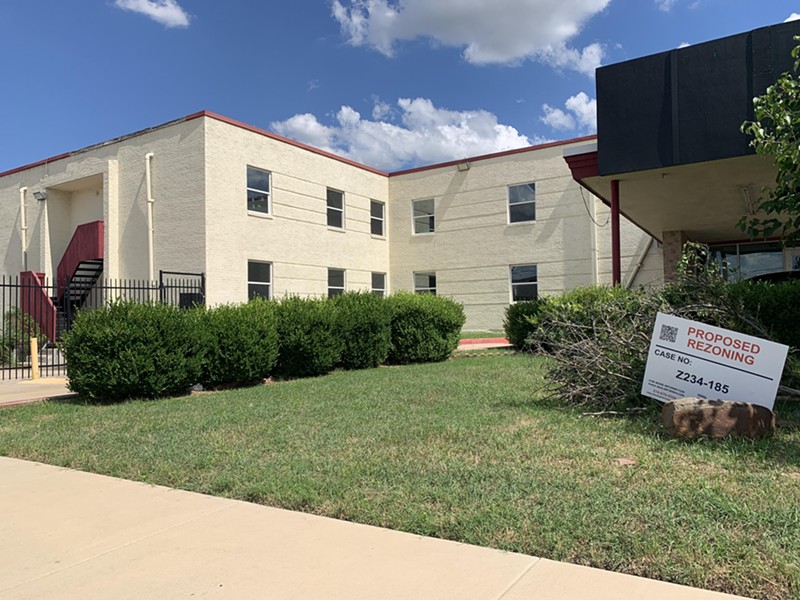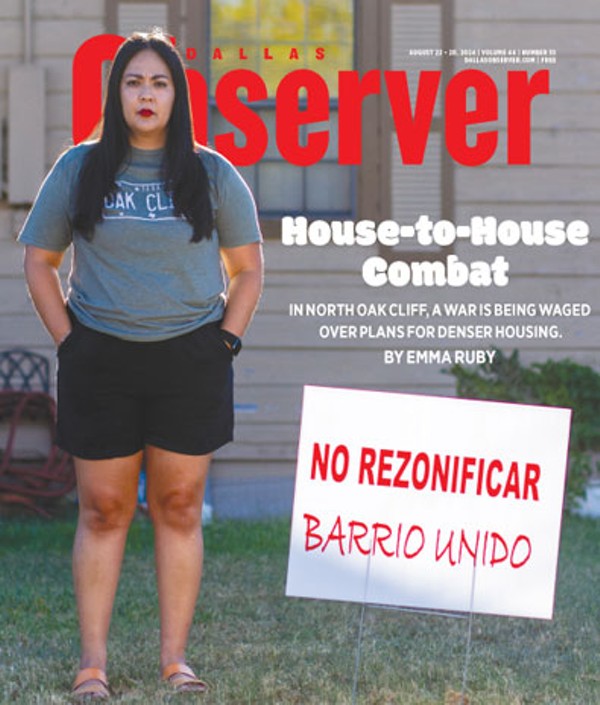After four years of bureaucratic back and forth, a city-owned motel in North Oak Cliff has finally received the go-ahead to move forward with plans to develop supportive housing for the chronically homeless.
A special use permit (SUP) submitted to the City Plan Commission by city staff rezones the site at 1950 Fort Worth Ave. from a hotel or motel use to a supportive housing use. Formerly known as the Hotel Miramar, the building was purchased by the city in 2020 for $3.5 million in federal COVID funds with the intention to rework the site into a permanent, supportive housing facility.
After hearing from neighbors for and against the project, District 1 City Plan Commissioner Christian Chernock asked that the SUP be passed as written with the clarification that the zoning change should not be eligible for automatic renewal after five years. The motion passed unanimously during last week's CPC meeting.
Chernock told the committee that he developed the amendment after receiving emails from neighbors opposed to the SUP. Many of the concerns voiced talking points “out of the [CPC’s] purview,” he said. He believes requiring the operator to reapply for the SUP in five years will give the neighbors some agency in the facility's operations.
“I think the neighborhood deserves the opportunity to look at this when we have maybe two years of operating history,” Chernock said. “There’s a long history here … What this project needs now is support.”
Hazy History and Split Support
The structure at 1950 Fort Worth Ave. is one of three city-owned buildings in Oak Cliff that were purchased to become supportive housing, and all three have had trouble moving forward. But the lack of progress on the Miramar facility has been “particularly disappointing,” city council members Paula Blackmon and Chad West said in a city memo last December.
The building faced a significant construction and financial setback in 2021 after asbestos was found in the walls, ceilings, pipes, boiler and floor tiles. The remediation cost $224,000, Christine Crossley, director of the Office of Homeless Solutions, told the council last October. In 2023, the project went back to square one after the nonprofit CitySquare pulled out of agreements to manage the facility. The city is still searching for a new operator for the project, and one will be named soon, Chad West, council member for District 1, told the Observer.
The initial drafts of the SUP called for the zoning case to be reinstated after three years, but West said that shorter timeframe would impose even more difficulties for the project and impede its ability to continue, ultimately leading the city to pursue a five-year permit.
West also said operators would likely hesitate to take on the facility if they faced a "potential loss of control that anything shorter than the requested five-year SUP" could lead to.
Reaching a neighborhood consensus on the technicalities of the facility's function has also introduced road bumps. While five neighbors voiced support at the May 16 CPC meeting for the SUP as written, a coalition of neighbors known as the Fort Worth Avenue Development Group opposed the SUP because of its “vague” nature. One woman read the FWADG opposition letter on behalf of the organization’s president, Katherine Homan.
The letter says the SUP submitted by the city does not specify some of the terms that neighbors were “originally led to believe” by the office of homeless solutions. Homan said some neighbors had agreed to a 40-unit conversion, but now believe the SUP will allow for “higher density.” Some neighbors had also advocated for the facility to support veterans or the elderly, which the SUP does not clarify.
“As written, this SUP grants unlimited latitude not only for how many will be housed at 1950 Fort Worth Avenue but also whether its residents will be permanent or temporary,” Homan’s letter said. “These are details about which the Fort Worth Avenue Development Group needs assurances in writing, since we have a history with the Office of Housing Solutions of repeatedly being told one thing and something else happening.”
But other neighbors spoke in favor of the project, including Alice Zaccarello, the executive director of an Oak Cliff-based nonprofit, The Well Community, which aids individuals struggling with homelessness and mental health.
“People are living unsheltered in every single city council district, and there need to be solutions in every single city council district,” Zaccarello said. “This project will not be a homeless magnet in the neighborhood.”
Zaccarello said she has served on the project’s neighborhood committee and supports plans for a vigorous consultation process that requires residents to be recommended for the facility through organizations like the Bridge rather than being able to “walk up and knock on the door.”
Another neighbor, Renata Wells, said she has lived near the property for 15 years and has seen how neighbors rally support around projects such as the Sprouts grocery store, which is expected to be built next year on a site across the street from the Hotel Miramar.
“When a developer shows up with a luxury grocery, we’re all about throwing everything out, saying it’s dated or it’s old. We conceded everything to the developer,” Wells said. “I think we can afford to be decent human beings here and provide some housing to other human beings.”
The zoning change will be finalized by a city council vote in June. A project timeline presented to the city council in January showed construction being completed as early as this fall.
"The neighborhoods near this site have been put through a lot with this project," West said. "But we are now on the path to a project that we can all be proud of if we can clear this zoning hurdle and finalize the agreement with the selected operator."













